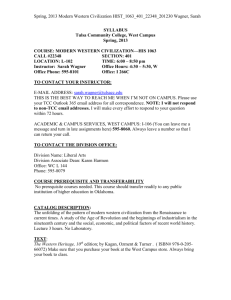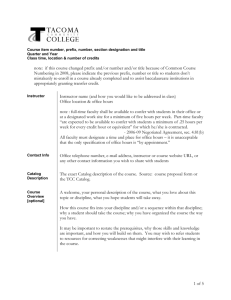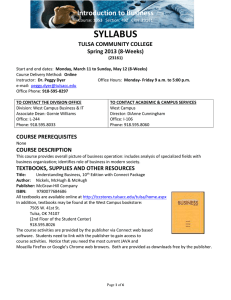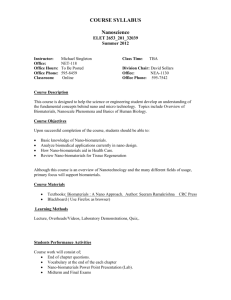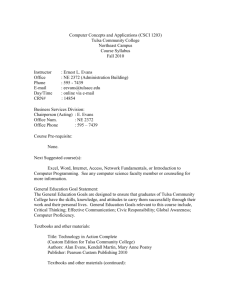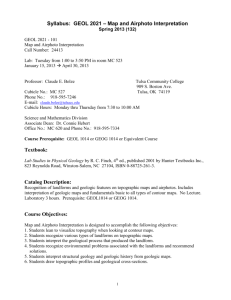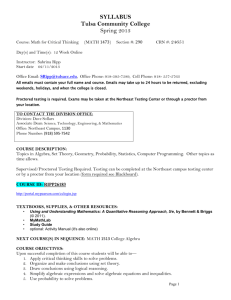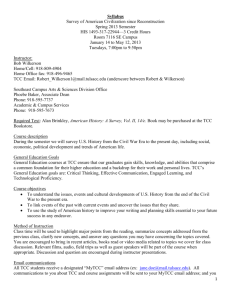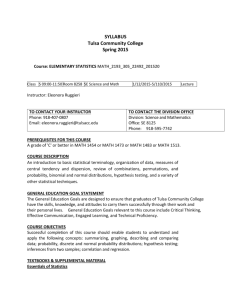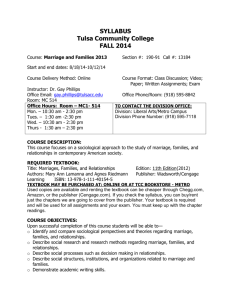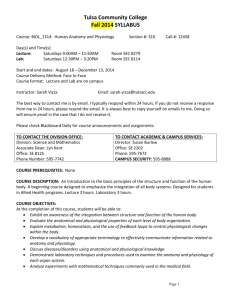ANCIET & MEDIEVAL WESTERN CIVILIZATION*HIS 1053
advertisement
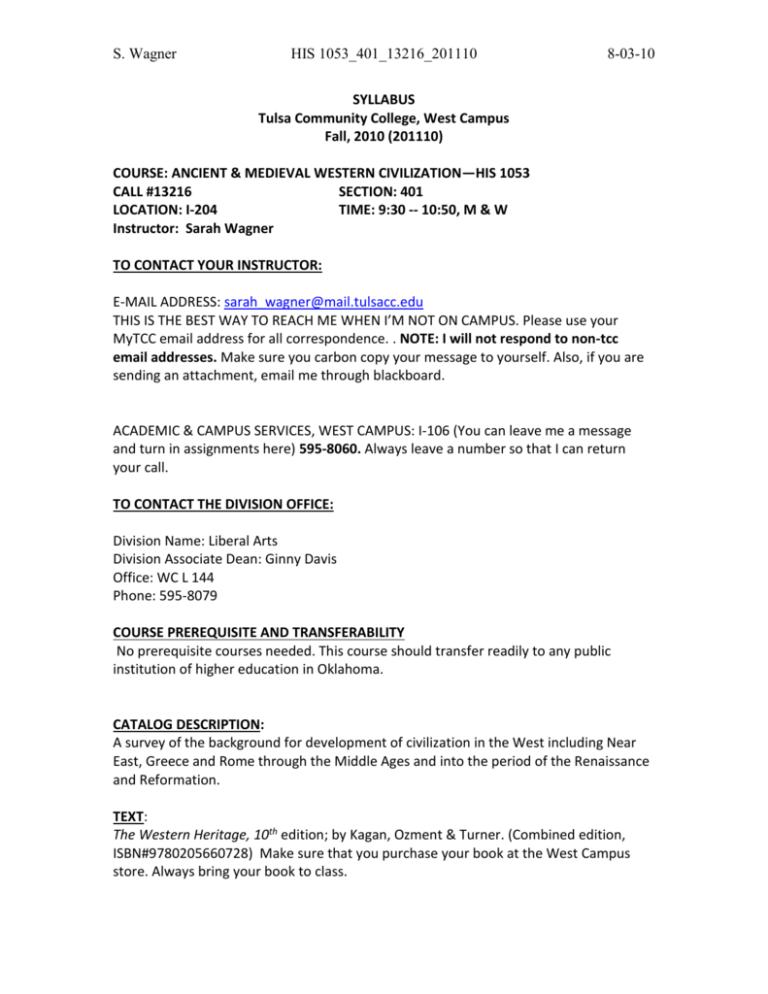
S. Wagner
HIS 1053_401_13216_201110
8-03-10
SYLLABUS
Tulsa Community College, West Campus
Fall, 2010 (201110)
COURSE: ANCIENT & MEDIEVAL WESTERN CIVILIZATION—HIS 1053
CALL #13216
SECTION: 401
LOCATION: I-204
TIME: 9:30 -- 10:50, M & W
Instructor: Sarah Wagner
TO CONTACT YOUR INSTRUCTOR:
E-MAIL ADDRESS: sarah_wagner@mail.tulsacc.edu
THIS IS THE BEST WAY TO REACH ME WHEN I’M NOT ON CAMPUS. Please use your
MyTCC email address for all correspondence. . NOTE: I will not respond to non-tcc
email addresses. Make sure you carbon copy your message to yourself. Also, if you are
sending an attachment, email me through blackboard.
ACADEMIC & CAMPUS SERVICES, WEST CAMPUS: I-106 (You can leave me a message
and turn in assignments here) 595-8060. Always leave a number so that I can return
your call.
TO CONTACT THE DIVISION OFFICE:
Division Name: Liberal Arts
Division Associate Dean: Ginny Davis
Office: WC L 144
Phone: 595-8079
COURSE PREREQUISITE AND TRANSFERABILITY
No prerequisite courses needed. This course should transfer readily to any public
institution of higher education in Oklahoma.
CATALOG DESCRIPTION:
A survey of the background for development of civilization in the West including Near
East, Greece and Rome through the Middle Ages and into the period of the Renaissance
and Reformation.
TEXT:
The Western Heritage, 10th edition; by Kagan, Ozment & Turner. (Combined edition,
ISBN#9780205660728) Make sure that you purchase your book at the West Campus
store. Always bring your book to class.
S. Wagner
HIS 1053_401_13216_201110
8-03-10
SUGGESTED RESOURCES
A Dictionary!
GENERAL EDUCATION GOALS
Critical Thinking
Effective Communication
Computer Proficiency
Civic Responsibility
Global Awareness
COURSE GOALS
This course is accepted as partial fulfillment of the Social Science requirement for most
of the Associate degrees offered at Tulsa Community College. Upon completion of this
course, you should be able to:
1. Identify and define the basic historical events, issues, and trends in the
development of Western Civilization.
2. Identify and discuss the meaning of major issues from this era and relate
their meaning to issues in your own life and the world around us now.
3. Demonstrate your knowledge and understanding of the material covered in
lectures and readings on examinations, assignments and in class discussions.
4. Develop your analytical abilities and ability to engage in “critical thinking”.
METHOD OF INSTRUCTION:
This course is a lecture course supplemented by assigned readings and class discussion.
A tentative reading schedule is attached to this syllabus. It is imperative that you read
the assigned material. In addition, supplemental handouts and videos may be used from
time to time. You are responsible for the completion of each reading at its assigned
time. NOTE: “Each student should expect to devote roughly two hours for every one
hour of class time for reading, studying and preparation of assignments outside of
class.”
Readings are designed to stimulate and guide discussions. Class discussions are
important as a means to help you learn how to analyze your own and other people’s
feelings, beliefs, and attitudes.
ADA POLICY
STUDENTS WITH SPECIAL NEEDS: Students with documented disabilities are provided
academic accommodations through the disABLED Student Resource Center (918-5957115) or Resource Center for the Deaf and Hard of Hearing (918-595-7428/TDD-TTY
981-595-7434). If any student is in need of academic accommodations from either
S. Wagner
HIS 1053_401_13216_201110
8-03-10
office, it is the student’s responsibility to advise the instructor so an appropriate referral
can be made no later than the first week of class. Students may also contact the
disABLED Student Services Offices directly at the telephone numbers indicated.
ACADEMIC ACCOMMODATIONS WILL NOT BE PROVIDED UNLESS APPROPRIATE
DOCUMENTATION IS PROVIDED TO THE DISABLED STUDENT SERVICES OFFICES TO
SUPPORT THE NEED.
EVALUATION TECHNIQUES:
There will be THREE examinations. The final exam will not be comprehensive. Exams will
cover material from the lectures and the text.
Exams must be written in blue or black ink. All paper will be provided. Exams are scaled
on the TCC format of 100%-90%=A, 89%-80%=B, 79%-70%=C, 69%-60%=D, 59%-0%=F.
There is a primary source paper worth 100 points. There is a movie paper worth 100
points. Students will also be required to produce and give one PowerPoint presentation
worth 100 points. This assignment includes a short paper. Topics for PowerPoints will be
assigned at a later date. The instruction sheets for these three assignments are posted
on BLACKBOARD under “Content”.
Quizzes and miscellaneous assignments will determine the final part of your grade.
Quizzes cannot be made up.
POINT BREAK DOWN
Exam I
Exam II
Exam III
Primary Source Assignment
PowerPoint Presentation
Movie Paper
Misc. Assignments/Quizzes
100 points
100 points
100 points
100 points
100 points
100 points
100 points
SCALE:
A=630 - 700
B=560 - 629
C=490 - 559
D=420 - 489
F=419 or below
MAKE-UP AND LATE ASSIGNMENTS POLICY
Be prepared to submit to me proof of emergency situations or illness that might cause
you to miss a scheduled exam. If you miss an exam, the make-up test must be taken
within one class period of the test date, at my convenience. Make-up tests will be taken
S. Wagner
HIS 1053_401_13216_201110
8-03-10
in the ACS Office (WC). The final must be taken on the day scheduled. Call me on the
day of the scheduled exam or due date if such an emergency exists.
Assignments are due at the beginning of class. No miscellaneous class assignments can
be accepted as late without proof of an emergency situation. Quizzes cannot be made
up.
Primary Source Papers and Movie papers may be turned in late, but a letter grade will
be deducted for each day. PowerPoints must be given when due.
ATTENDANCE POLICY & TARDINESS
Chronic tardiness is a disruption of the class and will be dealt with in accordance with
TCC codes of student behavior. Attendance will be taken and excessive absences will be
reported to the Registrar. Three absences = considered excessive.
INSTITUTIONAL STATEMENT
Each student is responsible for being aware of the information contained in the TCC
Catalog, the TCC Student Policies & Resources Handbook, and semester information
listed in the class schedule. All information may be viewed on the TCC website:
www.tulsacc.edu
WITHDRAWAL POLICY
The deadline to withdraw from a course shall not exceed 3/4 the duration of any class.
Contact the Counseling Office at any TCC campus to initiate withdrawal from a course
('W' grade) or to change from Credit to Audit. Check the TCC Academic Calendar for
deadlines. Students who stop participating in the course and fail to withdraw may
receive a course grade of “F,” which may have financial aid consequences for the
student. The last day to withdraw is on NOVEMBER 5th.
LEARNING SUPPORT SERVICES
Computers are available in the TLC. (i.e. “the Pit”). Tutoring is also available. If you need
information on MLA style, or help with your writing, the writing lab can assist you.
PLAGIARISM POLICY
Plagiarism is claiming, indicating, or implying that the ideas, sentences, or words of
another writer are your own. It includes having another writer do work claimed to be
your own, copying the work of another and presenting it as your own, or following the
work of another as a guide to ideas and expressions that are then presented as your
own. The student should review the relevant sections of the TCC Student Code of
Conduct Policy Handbook. A student guilty of plagiarism may receive a zero for the
assignment and an “F” in the course.
ACADEMIC DISHONESTY OR MISCONDUCT
S. Wagner
HIS 1053_401_13216_201110
8-03-10
Academic dishonesty (cheating) is defined as the deception of others about one’s own
work or about the work of another. Academic dishonesty or misconduct is not
condoned or tolerated at campuses within the Tulsa Community College system. Tulsa
Community College adopts a policy delegating certain forms of authority for disciplinary
action to the faculty. Such disciplinary actions delegated to the faculty include, but are
not limited to, the dismissal of disrespectful or disorderly students from classes. In the
case of academic dishonesty a faculty member may:
require the student to redo an assignment or test, or require the student to
complete a substitute assignment or test;
Record a "zero" for the assignment or test in question;
Recommend to the student that the student withdraw from the class, or
administratively withdraw the student from the class;
Record a grade of "F" for the student at the end of the semester.
Faculty may request that disciplinary action be taken against a student at the
administrative level by submitting such request to the Dean of Student Services.
COMPUTER SERVICES ACCEPTABLE USE
Access to computing resources is a privilege granted to all TCC faculty, staff, and
students. Use of TCC computing resources is limited to purposes related to the College’s
mission of education, research, and community service. Student use of technology is
governed by the Computer Services Acceptable Use Statements/Standards found in the
TCC Student Code of Conduct Policy Handbook. These handbooks may be obtained by
contacting and Student Activities or Dean of Student Services office.
CLASSROOM ETIQUETTE
Open and mutually respectful communication of varied opinions, beliefs, and
perspectives during classroom or online discussion encourages the free exchange of
ideas that is essential to higher learning and to the ability to learn from each other. Use
of any electronic device is at the discretion of the instructor.
No food is permitted in any TCC classrooms.
Students should clean up after themselves.
Cell phones/texting
--DON’T DO IT!!— A cell phone will be confiscated if it rings or if a student is
caught texting in class. If this request is not followed by any one person during the
semester each student will be required to deposit his/her phone in a container outside
of the classroom for the class period. If a student has an emergency he/she must
contact the instructor before class begins in order to receive instruction on how to
handle the situation. Be a responsible and respectful student in this course.
S. Wagner
HIS 1053_401_13216_201110
8-03-10
INCLEMENT WEATHER
TCC rarely closes. If extreme weather conditions or emergency situations arise,
TCC always gives cancellation notices to radio and television stations. This
information is also posted on the TCC website (www.tulsacc.edu).
SYLLABUS CHANGES
Occasionally, changes to the syllabus may be necessary. Students will be notified of any
changes to the syllabus in writing.
HELPFUL HINTS
Take notes over what you read and over the lectures. (Avoid underlining in text.)
Turn in all assignments.
Befriend a fellow student—make a study buddy.
Review on a regular basis; do not try to cram for the exams.
KEEP THIS SYLLABUS. (It’s on Blackboard!)
Always proofread.
Keep/save copies of all your assignments.
Read all instructions carefully.
Don’t send the instructor anything unrelated to this course.
Respect the belief systems of your fellow students.
Contact me if you have any question/problem!!
TENTATIVE READING SCHEDULE—ANCIENT & MEDIEVAL WESTERN CIVILIZATION
(Subject to change.)
WEEK ONE (August 16 and 18): CHAPTER ONE—The Birth of Western Civilization
WEEK TWO (August 23 & 25): CHAPTER TWO—The Rise of Greece
WEEK THREE (August 30 & September 1 ): CHAPTER THREE -- Classical & Hellenistic
Greece
WEEK FOUR (September 6 & 8): -- NO CLASS MONDAY/LABOR DAY -- CHAPTER THREE &
FOUR—Rome: From Republic to Empire.
WEEK FIVE: (September 13 & 15): Finish CHAPTER FOUR/Review SEPTEMBER 15 – EXAM
ONE
WEEK SIX (September 20 & 22): CHAPTER FIVE —The Roman Empire
S. Wagner
HIS 1053_401_13216_201110
8-03-10
WEEK SEVEN (September 27 & 29): CHAPTER SIX—Byzantium & Islam PRIMARY SOURCE
PAPER DUE on September 29
WEEK EIGHT (October 4 & 6): CHAPTER SEVEN -- The Middle Ages CHAPTER EIGHT—The
High Middle Ages
WEEK NINE (October 11 & 13): CHAPTER NINE—The Late Middle Ages/Review if time
allows.
WEEK TEN: October 18—EXAM TWO, October 20—CHAPTER 10—Renaissance &
Discovery – POWERPOINT PRESENTATIONS ASSIGNED
WEEK ELEVEN (October 25 and 27) MOVIE PAPER DUE October 27. Chapter 10
WEEK TWELVE (November 1 & 3): Finish the Renaissance and begin CHAPTER 11—The
Reformation.
WEEK THIRTEEN (November 8 & 10): Finish the Reformation. CHAPTER TWELVE—The
Age of Religious Wars
WEEK FOURTEEN (November 16 & 18): Finish CHAPTER 12.
WEEK FIFTEEN (November 22 & 24) CHAPTER THIRTEEN—European State Consolidation
NO SCHOOL NOVEMBER 24 – THANKSGIVING BREAK
WEEK SIXTEEN (November 29 & December 1): POWER POINT PRESENTATIONS DUE
We’ll finish up 13 and maybe get into Chapter 14
WEEK SEVENTEEN—FINAL EXAM—DECEMBER 8th
.
